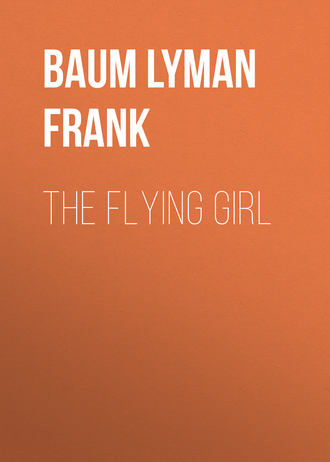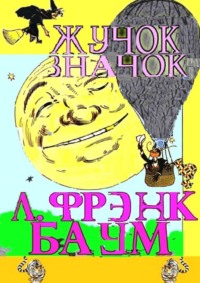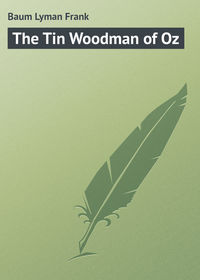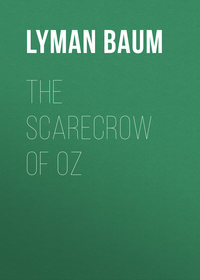 полная версия
полная версияThe Flying Girl
A dozen ready hands promptly released him from the wreck, but when they tried to lift him to his feet he could not stand. His leg was broken.
CHAPTER XVIII
THE ONE TO BLAME
Mr. Cumberford locked the doors of the hangar and refused to admit anyone but his own daughter. Even Reed and Wilson, having assisted to drag the wreck to its shed, were ordered peremptorily to keep out. Wilson obeyed without protest, but Reed was angry and said it was his duty to put the aircraft into shape again. Cumberford listened to him quietly; listened to his declaration that he had had nothing to do with the construction of the aëroplane and therefore could in no way be held responsible for the accident; and after the man had had his say his employer asked him to come to his hotel in the evening to consider what should be done. He also made an appointment with Wilson. Then he shut himself up in the hangar with Sybil.
Orissa had gone with Steve in the ambulance to the hospital, where she remained by his side until the leg was set and the young man felt fairly comfortable. The injury was not very painful, but Steve was in great mental distress because his accident would prevent his taking part in the aviation meet. All their carefully made plans for the successful promotion of the Kane Aircraft were rendered futile by this sudden reverse of fortune, and the youthful inventor constantly bewailed the fact that Burthon would now have a clear field and his own career be ignominiously ended.
Orissa had little to say in reply, for her own heart was aching and she saw no way to comfort her brother. When he was settled in his little white room, with a skillful nurse in attendance, the girl went home to break the sad news to their blind mother.
Meantime Mr. Cumberford was busy at the hangar. In spite of his usual nonchalance and obtuse manner – both carefully assumed – the man had a thorough understanding of mechanics and by this time knew every detail of young Kane’s aëroplane quite intimately. Also, he was a shrewd and logical reasoner, and well knew the accident had been due to some cause other than faulty parts or inherent weakness of the aircraft. So he took off his coat, rolled up his shirt sleeves and began a careful examination of the wreck.
It was Sybil, however, who stood staring at the aëroplane, always fascinating to her, who first discovered the cause of Steve’s catastrophe.
“See here, Daddy,” she exclaimed; “this guy-wire has been cut half through, in some way, and others are broken entirely.”
Mr. Cumberford came to her side and inspected the guy-wire. The girl was right. It was certainly odd that several strands of the slender but strong woven-wire cable had parted. Her father took a small magnifying glass from his pocket and examined the cut with care.
“It has been filed,” he announced.
Sybil nodded, but she seemed absent-minded and to have lost interest in the discovery.
“From the first I suspected the guy-wires,” she said. “When the aircraft collapsed I knew the wires had parted, and then – I thought of my clever uncle.”
Mr. Cumberford rolled down his sleeves and put on his coat.
“Three of the wires gave way,” he observed, “and it’s a wonder young Kane wasn’t killed. Come, ’Bil; we’ll go back to the hotel.”
They found the field deserted, their motor car being the last on the grounds. During the ride into town Sybil remarked:
“This affair will cause you serious loss, Daddy.”
“Why?”
“Steve can’t exhibit his device at the meet, and Uncle Burthon will be on hand to win all the laurels.”
“Don’t worry over that,” he said grimly. “We’ve ten days in which to outwit Burthon, and if I can’t manage to do it in that time I deserve to lose my money.”
Wilson came to the hotel promptly at eight o’clock for his interview with Mr. Cumberford. Said that gentleman:
“Tell me all that happened at the hangar after we left you and Reed there this morning.”
The man seemed reluctant at first, but finally decided to tell the truth. He appeared to be an honest young fellow, but knew quite well that his testimony would injure his fellow assistant.
“It was quite early, sir, when an automobile came into the field and a gentleman asked to see the aircraft. Mr. Reed was at the door, at the time, and I heard him reply that no one could be admitted. Then the gentleman said something to him in a low voice and Reed, after a little hesitation, turned to me and told me to guard the door. I did so, and the two walked away together. I saw them in close conversation for quite a while, and then Reed came back to the hangar and said: ‘The gentleman is having trouble with his motor car, Wilson, and one of his engines is working badly. You understand such things; go and see if you can help him, while I guard the door.’
“I thought that was queer, sir, for Reed is as good a mechanic as I am; but I took a wrench and walked over to the automobile, which was not a hundred yards distant. A little dried-up chauffeur was in the driver’s seat. The gentleman asked me to test the engines, which I did, and found there was nothing wrong with them at all. I hadn’t been a bit suspicious until then, but this set me thinking and I hurried back to the hangar. I hadn’t been away ten minutes, and I found Reed standing in the doorway quietly smoking his pipe. Everything about the aircraft seemed all right, so I said nothing to Reed except that his friend was a ringer and up to some trick. He answered that the man was no friend of his; that he had never seen him before and was not likely to see him again. That is all, sir. I didn’t leave the hangar again until Mr. Kane returned and took charge of it.”
Mr. Cumberford had listened intently.
“Do you know the name of the man with the automobile?” he asked.
“No, sir.”
“Describe him, please.”
Wilson described Burthon with fair accuracy.
“Thank you. You may go now, but I want you on hand to-morrow morning to assist in getting the machine back to Kane’s old hangar.”
“Very well, sir.”
Reed came a half hour after Wilson had left. His attitude was swaggering and defiant. Mr. Cumberford said to him:
“Reed, your action in filing the guy-wires is a crime that will be classed as attempted manslaughter. You are liable to imprisonment for life.”
The man grew pale, but recovering himself replied:
“I didn’t file the wires. You can’t prove it.”
“I’m going to try, anyway,” declared Cumberford. “That is, unless you confess the truth, in which case I’ll prosecute Burthon instead of you.”
Reed stared at him but, stubbornly made no reply.
“How much did he pay you for the work?” continued Cumberford.
No answer.
Mr. Cumberford touched a bell and a detective entered.
“Officer, I accuse this man of an attempt to murder Stephen Kane,” said he. “You overheard the recent interview in this room and understand the case perfectly and the evidence on which I base my charge. You will arrest Mr. Reed, if you please.”
The officer took the man in charge. Reed was nervous and evidently terrified, but maintained a stubborn silence.
“Confession may save you,” suggested Cumberford; but Reed was pursuing some plan previously determined on, and would not speak. So the officer led him away.
Next morning the wrecked aëroplane was transferred to the workshop in the Kane garden, where Wilson, under the supervision of Orissa and Mr. Cumberford, began taking it apart that they might estimate the damage it had sustained. Orissa’s face bore a serious but determined expression and she directed the work as intelligently as Steve could have done. Cumberford, who had brought a pair of overalls, worked beside Wilson and in a few hours they were able to tell exactly what repairs were necessary.
“The motors are not much injured,” announced Orissa, “and that is indeed fortunate. We need one new propeller blade, five bows and struts for the lower plane, new wing ends and guy-wires and almost a complete new running gear. It isn’t so very bad, sir. With the extra parts we have on hand I believe the aircraft can be put in perfect condition before the meet.”
“Good!” exclaimed Mr. Cumberford. “Then our greatest need is to secure a competent aviator.”
“To operate Stephen’s machine?”
“Of course. He’s out of commission, poor lad; but the machine must fly, nevertheless.”
Orissa’s blue eyes regarded him gravely. She had been considering this proposition ever since the accident.
“Our first task,” said she, “is to get my brother’s invention thoroughly repaired.”
“But the question of the aviator is fully as important,” persisted her friend. “Wilson,” turning to the mechanic, “do you think you could operate the aircraft?”
“Me, sir?” replied the man, with a startled look; “I – I’m afraid not. I understand it, of course; but I’ve had no experience.”
“No one but Stephen Kane can claim to have had experience with this device,” said Mr. Cumberford; “so someone must operate it who is, as yet, wholly inexperienced.”
“Can’t you find an aviator who has used other machines, sir?” asked Wilson. “The city is full of them just now.”
“I’ll try,” was the answer.
Mr. Cumberford did try. After engaging another mechanic to assist Wilson he interviewed every aviator he could find in Los Angeles. But all with the slightest experience in aërial navigation were engaged by the various aëroplane manufacturers to operate their devices, or had foreign machines of their own which were entered for competition. He was referred to several ambitious and fearless men who would willingly undertake to fly the Kane invention, but he feared to trust them with so important a duty.
Returning one day in a rather discouraged mood to Orissa, who was busy directing her men, he said:
“I have always, until now, been able to find a man for any purpose I required; but the art of flying is in its infancy and the few bold spirits who have entered the game are all tied up and unavailable. It looks very much as if we were going to have a winning aëroplane with no one to develop its possibilities.”
Orissa was tightening a turnbuckle. She looked up and said with a smile:
“The aviator is already provided, sir.”
“What! You have found him?” exclaimed Mr. Cumberford.
“I ought to have said ‘aviatress,’ I suppose,” laughed the girl.
“My daughter? Nonsense.”
“Oh, Sybil would undertake it, if I’d let her,” replied Orissa. “But I dare not trust anyone but – myself. There is too much at stake.”
“You!”
“Just Orissa Kane. I’ve been to the hospital this morning and talked with Steve, and he quite approves my idea.”
Mr. Cumberford looked at the slight, delicate form with an expression of wonder. The girl seemed so dainty, so beautiful, so very feminine and youthful, that her suggestion to risk her life in an airship was positively absurd.
“You’ve a fine nerve, my child,” he remarked, with a sigh, “and I’ve no doubt you would undertake the thing if I’d give my consent. But of course I can’t do that.”
“Why not?”
“You’re not fit.”
“In what way?”
“Why, er – strength, and – and experience. Girls don’t fly, my dear; they simply encourage the men to risk their necks.”
“Boo! there’s no danger,” asserted Orissa, scornfully. “One is as safe in the Kane Aircraft as in a trundle-bed.”
“Yet Steve – ”
“Oh, one may be murdered in bed, you know, as well as in an aëroplane. Had those guy-wires not been tampered with an accident to my brother would have been impossible. Have you stopped to consider, sir, that even when the planes separated and crumpled under the air pressure Steve’s device asserted its ability to float, and dropped gently to the ground? Steve managed to get hurt because he fell under the weight of the motors; that was all. Really, sir, I can’t imagine anything safer than the aircraft. And as for brawn and muscle, you know very well that little strength is required in an aviator. Skill is called for; a clear head and a quick eye; and these qualities I possess.”
“H-m. You think you can manage the thing?”
“I know it – absolutely. I’ve talked over with Steve every detail from the very beginning, and have personally tested all the working parts time and again, except in actual flight.”
“And you’re not afraid?”
“Not in the least.”
“You won’t faint when you find yourself among the clouds?”
“Not a faint, sir. It isn’t in me.”
Mr. Cumberford fell silent and solemn. He began to seriously consider the proposition.
CHAPTER XIX
PLANNING THE CAMPAIGN
That evening the secretary of the Aëro Club telephoned Mr. Cumberford to ask if he wished to withdraw his entry from contest in the coming aviation meet.
“By no means,” was the reply.
“But you state that Kane is to be the aviator, and we are informed that Kane has a broken leg.”
“Leave the entry as it stands: ‘Kane, Aviator,’” said Cumberford, positively.
“Very well, sir,” returned the secretary, evidently puzzled.
But his friend Burthon, who had suggested his telephoning, was highly pleased when he learned Mr. Cumberford’s decision.
“All right,” he observed, with satisfaction; “we’ll leave the Kane Aircraft on the programme, for everyone is talking of the wonderful device and the announcement of its competition will be the greatest drawing card we have. But the entry of ‘Kane, Aviator’ will disqualify anyone but Kane from operating the aircraft, and I happen to know his leg is in a plaster cast and he cannot use it for months to come.”
“Won’t it hurt us to disqualify the Kane Aircraft and have it withdrawn at the last moment?” inquired the secretary, doubtfully.
“No; for I’m going to spring on the crowd the biggest surprise of the century – Burthon’s Biplane.”
“Are you sure of its success, sir?”
“Absolutely. Kane copied his machine from mine, as I have before explained to you, and in addition to all the good points he has exhibited I have the advantage of a perfect automatic balance. If Kane’s device had been equipped with it he wouldn’t have fallen the other day.”
Perhaps Mr. Burthon was sincere in saying this. He had had no opportunity to examine Stephen’s latest creation at close quarters, but on the day of the trial at Kane Park he had observed the fact that Stephen had abandoned the automatic balance he had first patented, and now had recourse to crossed planes. Both Burthon and his mechanics considered the original device the best and most practical, and they depended upon it for the biggest advertisement of Burthon’s Improved Biplane, having of course no hint that Stephen had tested it and found it sadly lacking.
On the 26th the Burthon flyer was ready for trial, and Tot Tyler, after several attempts, got it into the air and made a short flight that filled the heart of Mr. Burthon with elation.
“Curtiss and the Wrights will do better than that, though,” observed the ex-chauffeur, “to say nothing of those daredevils Latham and Hoxsey. I’ll improve after a few more trials, but I can’t promise ever to do better than the other fellows do.”
“That isn’t to be expected,” returned Burthon. “I’m not backing you to excel the performances of the old aviators; that isn’t my point. The improvements and novelties we have to show will take the wind out of the sails of all other aëroplanes and result in a flood of orders. Comparing machine for machine, we’re years in advance of the Wrights and Curtiss – and centuries ahead of those foreign devices.”
“Perhaps,” admitted Tot. “But Kane’s aëroplane is practically the same as your own, and it is still on the programme.”
“It won’t fly, though,” declared Burthon, with a laugh. “Don’t worry about anything but your own work, Tyler. Leave all the rest to me.”
The man knew his employer was playing a hazardous game and that he had stolen outright the Kane Aircraft, and while the knowledge did not add to Tot Tyler’s nerve or assurance he was gleeful over the prospect of “doing” his enemy, Cumberford. The little fellow was bold enough – even to the point of bravery – and fully as unprincipled as his employer. His hatred of Cumberford was so acrid that he would have gone to any length, even without pay, to defeat his plans, and Burthon found him an eager and willing tool. Nevertheless, the little man scented danger ahead of them and had an idea that trouble was brewing from some unknown source.
By this time Burthon had begun a campaign of widespread publicity, and in spite of the long list of famous aviators in the city the newspapers were filled with pictures of the Burthon device and accounts of the marvelous flights of Totham Tyler. Nothing more was heard of the Kane Aircraft, but the public had not forgotten it and many were puzzled that two local aëroplane makers should be exhibiting identically the same improvements, each claiming to have originated them. As for the visiting aviators, they were interested, but held their peace. The performances at the coming competition would tell the story of supremacy, and whatever good points were displayed by the local inventors could doubtless be adapted to their own craft. They waited, therefore, for proof of the glowing claims made in the newspapers. Many promising inventions have turned out to be failures.
The public was, to an extent, in the same doubting mood. Kane’s magnificent public flight had ended with an accident, while Tyler’s preliminary exhibitions were in no way remarkable as compared with records already established. The meet would tell the story.
Meantime Orissa completed her repairs. On the day that Steve came home from the hospital in an ambulance she wheeled him in an invalid chair to the hangar and allowed the boy to inspect a perfect aircraft. The young man suffered no pain, and although he was physically helpless his eye and brain were as keen as ever. Being wheeled around the device, so that he could observe it from all sides and at all angles, he made a thorough examination of his sister’s work and declared it excellent.
“Think you can manage it, Ris?” he asked, referring to her proposed venture.
“I am sure I can,” she promptly replied. “You must understand – all of you,” turning to confront Mr. Cumberford and Sybil, who were present, “that I am not undertaking this flight from choice. Had Steve been able to exhibit his own aëroplane I might never have tried to fly alone; but it seems to me that our fortune, my brother’s future career, and our friend Mr. Cumberford’s investment, all hinge upon our making a good showing at Dominguez Field. No one but me is competent to properly exhibit the aircraft, to show all its good points and prove what it is capable of doing. Therefore I have undertaken to save our reputation and our money, and I am sure that my decision is proper and right.”
“I agree with you,” said Steve, eagerly. “You’re a brave little girl, Ris.”
“I have but one request to make, Mr. Cumberford,” she added.
“What is it, Orissa?” he inquired.
“Do not advertise me as ‘The Girl Aviator,’ or by any other such name. I prefer people should remain ignorant of the fact that a girl is operating the Kane Aircraft. Can’t you keep quiet about it?”
“I can, and will,” he asserted. “Indeed, my dear, I much prefer that course. It will be all the more interesting when – when – the discovery is made.”
“I do not wish to become a celebrity,” she said, seriously. “One in the family is enough,” glancing proudly at Steve, “and I’m afraid nice people would think me unmaidenly and bold to become a public aviator. I’m not at all freakish – indeed, I’m not! – and only stern necessity induces me to face this ordeal.”
“My dear,” said Mr. Cumberford, looking at her admiringly, “your feelings shall be considered in every possible way. But you must not imagine you are the first female aviator. In Europe – especially in France – a score of women have made successful flights, and not one is considered unwomanly or has forfeited any claim to the world’s respect and applause.”
“The most successful aviators of the future,” remarked Stephen, thoughtfully, “are bound to be women. As a rule they are lighter than men, more supple and active, quick of perception and less liable to lose their heads in emergencies. The operation of an aëroplane is, it seems to me, especially fitted to women.”
“Ah!” exclaimed Sybil, with a whimsical glance at the speaker, “I have discovered my future vocation. I shall aviate parties of atmospheric tourists. When the passenger airships are introduced I’ll become the original sky motoress, and so win fame and fortune.”
Steve laughed, but shook his head.
“The airship of the future will not be a passenger affair,” he predicted, “but an individual machine for personal use. They’ll be cheaper than automobiles, and more useful, for they can go direct to their destination in a straight ‘air-line.’ Men will use them to go to business, women to visit town on shopping expeditions or to take an airing for pleasure; but I’m sure they will be built for but one person.”
“Then I’ll have one and become a free lance in the sky, roaming where I will,” declared Sybil.
This unconventional girl had developed a decided fancy for the inventor, and while in his presence it was noticed that she became less reserved and mysterious than at other times. Steve liked Sybil, too, although she was so strong a contrast to his own beautiful sister. When she cared to be agreeable Miss Cumberford proved interesting and was, Steve thought, “good company.” Orissa observed that Sybil invariably presented the best side of her character to Steve. While he was in the hospital the girl visited him daily, and now that he had come home again she passed most of her time at the hangar.
Mr. Cumberford was greatly annoyed to learn that the Kane headquarters at Dominguez Field had been given a location in the rear of all the others, where it would be practically unnoticed. Of course this slight was attributed to Burthon’s influence with the committee of arrangements, of which he was a member. Burthon’s own hangar, on the contrary, had a very prominent position. From his man Brewster, as well as from others, Mr. Cumberford also learned that Burthon had hinted he would prevent the Kane Aircraft from taking any part in the contests.
All these things worried the Kane party, whose anxieties would have been sufficient had they not been forced to encounter the petty malice of Burthon. Sybil, silently listening to all that was said, assumed a more mysterious air than usual, and on the day previous to the opening of the great aviation meet she informed her father that she would not accompany him to Dominguez, where he was bound to attend to all final preparations. The decision surprised him, but being accustomed to his daughter’s sudden whims he made no reply and left her in their rooms at the hotel.
CHAPTER XX
UNCLE AND NIECE
When her father had gone Sybil addressed a note to Mr. Burthon which read:
“I will call upon you, at your club, for a private interview at twelve o’clock precisely. As all your future depends upon this meeting you will not fail to keep the appointment.”
She signed this message with the initials “S. C.” and Mr. Burthon, receiving it as he was about to start for Dominguez in his motor car, for the messenger had had a lively chase over town to catch him, read and reread the epistle carefully, was thoughtful a moment, and then ordered his man to drive him to the club.
“‘S. C.,’” he mused; “who on earth can it be? A woman’s handwriting, of course, crude and unformed. When women intrigue there is usually a reason for it. Better find out what’s in the wind, even at the loss of a little valuable time. That’s the safest plan.”
He reached his club at exactly twelve o’clock and heard a woman inquiring for him of the doorkeeper. He met her, bowed, and without a word led her to his own private sitting room, on the third floor. The woman – or was it a girl? – was, he observed, heavily veiled, but as soon as they were alone she removed the veil and looked at him steadfastly from a pair of dark, luminous eyes.
Mr. Burthon shifted uneasily in his chair. He had never seen the girl before, yet there was something singularly familiar in her features.
“Be good enough to tell me who you are,” he said in the gentle tone he invariably employed toward women. “I have granted this interview at your request, but I am very busy to-day and have little time to spare you.”









